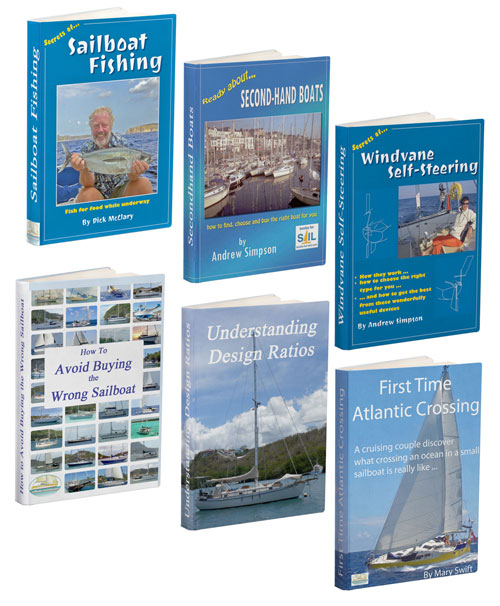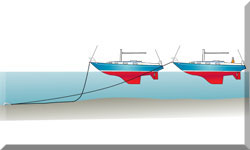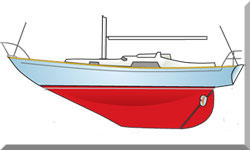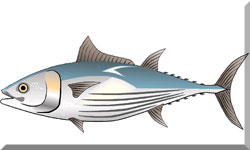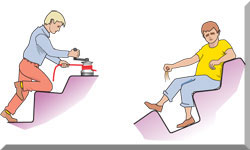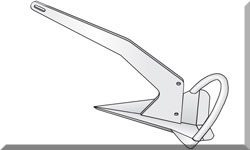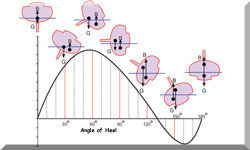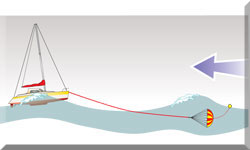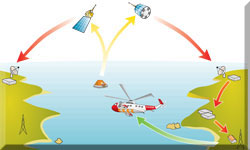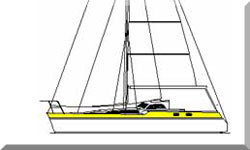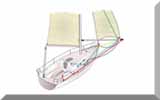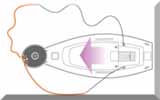- Home
- Sailing Authors & Their Writings
- Dr Michael Cohen
- Flow State
Going with the Flow
by Michael Martin Cohen, M.D.
Think about the last time you were so engaged in an activity – boating or otherwise – that you simply lost track of time. You were so focused on the task or race that nothing else mattered.
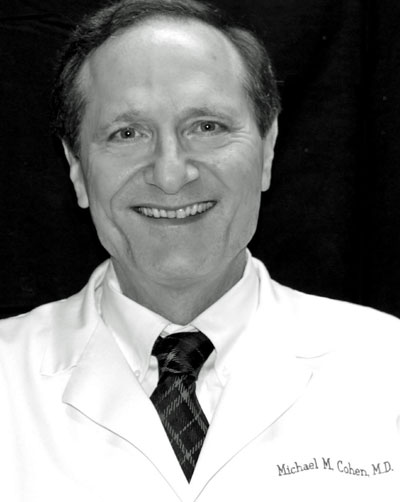 Michael Martin Cohen, M.D.
Michael Martin Cohen, M.D.This is flow state previously known (for athletes) as being “in the zone.”
Although it was felt to exist only in intense athletic competition, that is definitely not the case. Artists, musicians, scientists, and almost anyone who is absorbed in completing a task that is challenging can experience it. Michelangelo who painted the Sistine Chapel from 1508 through 1512 was described as often being in a flow state.
There are countless references in the nautical literature, especially in long distance sailors. And I would recommend that you view this short video from US Sailing 2018 which will give you some idea of flow and sailing athletes:
The Flow State: US Sailing Team 2018
It is not about finding out what makes you happy and doing more of it – for that see Dr. Martin Seligman (University of Pennsylvania) and the theory of Positive Psychology. Rather it is about becoming immersed in something that requires commitment, skill, perseverance – boating, painting, chess, music – and continuing it until the end. It is only at the end of the task, race, or journey that the person experiences happiness (Michelangelo must have felt rather good in 1512!)
Flow state may certainly be present in sailboat and power boat racing, as well as coastal and long-distance cruising.
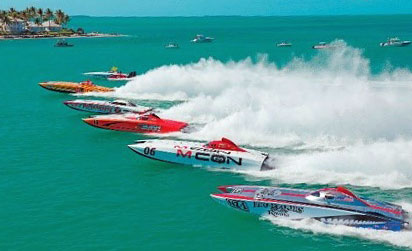 Fig 1: These powerboat racers may well be in the Flow State
Fig 1: These powerboat racers may well be in the Flow StateBut probably not during day sailing or recreational boating or fishing, simply because there is not really a challenge to pit your skills against – these activities are more about relaxation (which is not to be discouraged, mind you). But with flow state we are talking about a different mindset of total absorption.
Dr. Tim Herzog should know. He is a sailing psychologist and Clinical Professional Counsellor and Mental Performance Coach:
I think all mental skills are relevant. You may have heard about the term “the zone” that gets a lot of attention in the media. The research term for “the zone” is “flow” and psychologist Mihaly Csikszentmihalyi coined the term. “Flow” refers to those moment when we are really locked in what we are doing and things are clicking; we have full present moment, awareness, the challenge in front of us feel like a stretch but within reach, and time can even feel distorted, like moving in slow motion or really fast. “Flow” feels very good and can be kind of addictive and as much as we want to force those flow moments into happening, forcing them paradoxically makes them even less likely to happen. 1
Flow state is a state of mind and body in which you are both productive and happy. You feel good and you do not have to force yourself to work, rather it just proceeds almost automatically. It seems as though you are flowing through your work.
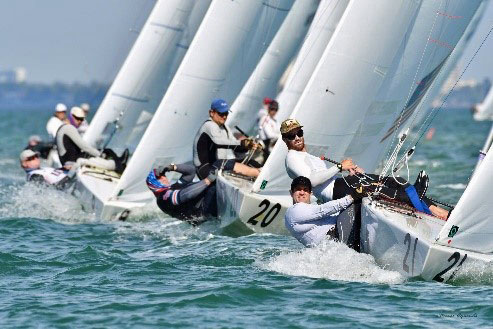 Fig2: In the Flow state?
Fig2: In the Flow state?Here is an example of a swimmer from “Flow in Sports”:
When I’ve felt happiest with my performance, I’ve sort of felt one with the water and my stroke and everything… I was really tuned into what I was doing. I knew exactly how I was going to swim the race, and I just knew I had it all under control and I got in and I was really aware of what everyone in the race was doing. I was just totally absorbed by my stroke and I knew I was passing them but I didn’t care. I mean it’s not that I didn’t care; I was going, “Oh this is cool!” And I just swam and won, and I was totally in control of the situation. It felt really cool. 2
The remainder of this article will follow this basic outline:
- What is flow, how is it defined?
- What is the effect of flow on our body and mind?
- How do we get into the flow?
Description and Definition
In 1972, psychologist Mihaly Csikszentmihalyi published an influential book entitled Flow: The Psychology of Optimal Experience, where he described the experiences that many creative people have, including athletes, musicians, writers, and artists. It can be encapsulated in the concept that a “good life is one that is characterized by complete absorption in what one does.” Csikszentmihalyi describes flow as “being completely involved in an activity for its own sake. The ego falls away. Time flies. Every action, movement, and thought follows inevitably from the previous one, like playing jazz. Your whole being is involved and you’re using your skill to the utmost.”
The major characteristics of the flow state are:
- intense and focused concentration on what one is doing in the present moment, a merging of action and awareness;
- loss of reflective self-consciousness (athletes, for example, describe indifference to the crowd; they are focused on what needs to be done at that moment);
- distortion of temporal experience (often described as the clock slowing down or stopping);
- experience of the activity as intrinsically rewarding.
If that doesn’t sound like many sailing experiences, I don’t know what does.
Flow is achieved when there is a balance between the challenge and the knowledge that you have the skills to meet the challenge. The same kind of thing occurs in music when the musician gets lost in improvisation during a jazz solo. (Figure 3)
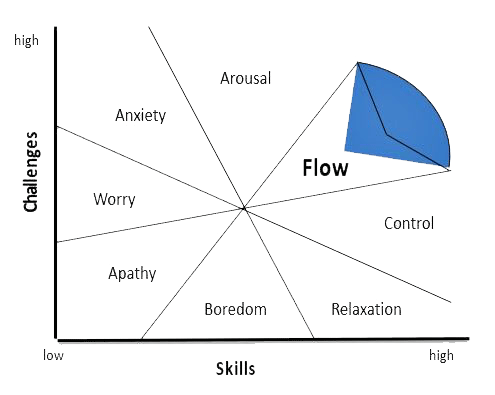 Fig 3: The Achievement of Flow
Fig 3: The Achievement of FlowIf you look at the various sectors in Figure 3 you will undoubtedly be able to identify portions of your life with each one! Moderate skills but no challenge -> boredom. For sure. High skills and low challenge -> Relaxation, like being out for the day in the bay. Low skills and high challenge -> anxiety (we’ve all had that from time to time).
Most people assume that relaxation alone will make them happy. They want to do less and sit with their feet up drinking a beer. 3 And that is fine for short periods but Csikszentmihalyi feels that most people have this entirely wrong.
“The best moments in our lives are not the passive, receptive, relaxing time. The best moments usually occur if a person’s body or mind is stretched to its limits in a voluntary effort to accomplish something difficult and worthwhile.” 4
Humans, it seems are at their best and happiest when they are immersed deeply in something challenging.5
Csikszentmihalyi has put together a checklist of sorts regarding flow, characterized by nine components:
- The challenge-skills balance: The task cannot be too easy or too difficult, and the person must have the necessary skills. As athletes improve their skills, the challenge increases and hopefully they continue to improve. (see Figure 3 above)
- The merging of action and awareness: The person’s performance feels natural without distraction by anxiety, pain, or anything else. Action is almost automatic.
- Clear goals: These are part and parcel of the activity.
- Feedback: The feedback may be internal, such as when someone performs a difficult manoeuvre flawlessly. The feedback from his or her own kinesthetic awareness (body movement) is as important or more important than the feedback from a judge or fans in the crowd.
- Total concentration and focus: In order to accomplish a task when the challenge is just at or above the person’s skill level, the task requires complete concentration.
- Sense of control: People never have ultimate control (think wind and waves), but the person feels he or she has more than sufficient control of the outcome.
- Loss of self-consciousness: A person is no longer worried about being judged by others, or him- or herself.
- Transformation of time: The person is totally immersed, and time just passes without notice.
- Autotelic experience: The experience or activity has an end or purpose in itself. A person does not perform for any other reason except that it gives him or her pleasure—not for specific external rewards. It is not until after the flow experience that the person experiences joy.
The above checklist has been turned into flow
state scales – and there are now a number of different flow scales meant to
document the degree of flow. And there is good internal agreement that if a person scores high on these flow
state scales, he or she is most likely in a state of flow. But to be in a state
of flow you do not need to check every box. Studies of athletes who have
been in a self-reported flow state have shown that most have experienced at
least 3 components and many who achieve a state of flow can identify 5 or 6.
The Body in Flow
Is there any way to tell if someone is in the flow state or do we just have to depend upon their assertion and perhaps a score sheet?
And do we know who is likely to get into a flow state? One study found that it was positively related to persistence, novelty seeking and self-transcendence. 6 Another study demonstrated that there may be a genetic component for people who are prone. 7
What is still missing is the understanding of what is happening in the mind / brain of the sailor when in a state of flow. There is general agreement on the psychology of flow but what about the neuroscience?
The major problem is that it is simply too difficult to do brain research on the water! You can’t easily monitor the brain’s electrical activity on the water (EEG) and you certainly can’t obtain an MRI scan!
So, we are stuck. Or are we? As mentioned previously, most of the psychology studies of flow have involved athletes and musicians. Musicians are a lot easier to study. For example, they can play their instrument inside the MRI scanner or while attached to an EEG. Flow has been studies extensively in jazz musicians who get into a flow state while improvising on their instrument.
Some of the most interesting work in this regard has been done by ENT physician, neuroscientist, and amateur musician, Dr. Charles Limb. One of his findings, which may be common to most people who get into the flow state, is that there is reduced activity in the prefrontal area of the brain – that area right behind your forehead that is the key to working memory, decision making, self-criticism – all of the things that make us most human and which can interfere with the flow state.
If you are in a state of flow where everything you do seems to be effortless the last thing you want is internal advice or criticism (from the criticism part of your brain!). You just want to let it flow no matter what you are doing – sailing, boating, making music or art or just doing what your particular challenge is.
Think of it this way – if you practice a skill (whatever it is) and put in your hours perfecting that skill, you want to perform that skill without constant oversight of each component. Certainly, you need some oversight – changes need to be made in strategy especially if you are in a competition – but you don’t want your frontal lobes constantly “looking over your shoulder” so to speak.
For example, in a race, you may need to decide to tack earlier than originally planned. Fine, but you don’t want to think at all about the motor skills needed to come about. That should be on autopilot. The basics should be so well rehearsed that they flow automatically. This toning down of your internal frontal lobe activity has been termed “hypofrontality.” This transient hypofrontality also saves the brain a lot of energy and allows the remainder of the brain those resources desperately needed to compete at such an intense level.
The reason flow has been studied most often in athletes and musicians is that both have to perform at their best and try to give a peak performance. One study compared elite musicians and athletes in four of the flow dimensions. They found that in terms of the transformation of time and autotelic experience (experience for experience sake- see #9 above) they were higher in musicians while clear goals and unambiguous feedback were higher in athletes. Satisfaction with life was positively correlated with all 9 dimensions of flow (see above) but only the skills-challenge balance was a significant predictor for satisfaction with life. So, if you want to be satisfied with your life choose your skills and your challenges wisely.
How Do I Get into a Flow State?
One simple tongue-in-cheek answer is the classic musician-in-New York asking for directions joke:
Question: “Pardon me, but how do I get to Carnegie Hall”
Answer: “Practice, practice, practice”
That little joke really addressed two issues: you need to have the requisite skill set which requires a total command of whatever it is you wish to do. And you have to choose the right challenge for your skill set [you may or may not be ready for Carnegie Hall].
That’s the straightforward part. The difficult part is getting your mind and brain ready for the skills / challenge. And that also requires dealing with your own psychological “baggage.” If you are a cruising sailor, it may require introspection, yoga, mindfulness, meditation, or whatever helps you deal with your anxiety, perfectionism, attention deficit, etc. If you are a racing boater or sailor then your team trainer or a mental performance coach like Dr. Herzog may help.
From a realistic point of view, getting into the flow is a worthy goal, no doubt. But understanding the process and what is holding you back is probably more important. Clearly #2 and #5 involve commanding your attention and concentration (think of Michelangelo) and achieving a state of effortless attention. In this day and age of social media that may prove your most worthy opponent. But unless you can achieve effortless attention to the task at hand, even approaching a flow state may be out of reach.
Some of you might wonder: “If achieving the flow state is relatively difficult, even for athletes at the top of their game, what relevance can this have for me?” If you are a sailing or boating athlete, it is extremely relevant. Analyzing your performance or the performance of your team in light of Csikszentmihalyi’s 9 characteristics may help you or your team find areas which require improvement. Perhaps it is lack of focus, improper assessment of your skills versus the challenge of the event, lack of clear goals, or imprecise feedback. Any of those can stand in the way of peak performance.
But even if you are not competing athletically, there is always the challenge of improving performance in whatever nautical (or non-nautical) task you wish to accomplish. The closer you are to entering the flow state the more times it will happen and the more successful you are likely to be. And recall that for both elite musicians and athletes all 9 components were positively correlated with life satisfaction. What more could we ask?
 May the Flow be With You
May the Flow be With You1 www.psychology of sailing.com/the-flow-of-sailing-an-interview-with-tim-herzog
2 Susan Jackson and Mihaly Csikszentmihalyi, Flow In Sports, 1999
3 "Give a man a fish and feed him for a day. Give him a fishing lesson and he'll sit in a boat drinking beer every weekend." - Alex Blackwell [author, sorry I couldn’t help myself]
4 Mihaly Csikszentmihalyi, Flow,
5 “We are not the only species able to solve problems—not even close. However, to my knowledge, we are the only species that experiences enjoyment by setting problems or challenges – beyond what we have previously done – with the express purpose of seeing if we can meet those higher goals, or even beat them! That may be the element that separates the human brain from the primate brain, and the brains of other species: the ability to develop the skills necessary to solve increasingly challenging problems and, at least from time to time, maintaining attention to the degree that we are able to experience flow.” Healthy Boating and Sailing, the author
6 Teng, Who Are Likely to Experience Flow; Impact of temperament and character on flow, Personality and Individual Differences 50(2011) 863-868
7 Gyurkovics, et al. Individual differences in flow proneness are linked to a dopamine D2 receptor gene variant. Consciousness and Cognition doi.org/10.1016/j.concog.2016.02.014
8 Habe, Biasutti, Kajtna, Flow Satisfaction with Life in Elite Musicians and Top Athletes, Frontiers in Psychology March 2019 doi: 10.3389/fpsyg.2019.00698
Recent Articles
-
Albin Ballad Sailboat: Specs, Design, & Sailing Characteristics
Jul 09, 25 05:03 PM
Explore the Albin Ballad 30: detailed specs, design, sailing characteristics, and why this Swedish classic is a popular cruiser-racer. -
The Hinckley 48 Sailboat
Jul 09, 25 02:44 PM
Sailing characteristics & performance predictions, pics, specifications, dimensions and those all-important design ratios for the Hinckley 48 sailboat... -
The Hinckley Souwester 42 Sailboat
Jul 09, 25 02:05 PM
Sailing characteristics and performance predictions, pics, specifications, dimensions and those all-important design ratios for the Hinckley Souwester 42 sailboat...
